According to statistics, prostate inflammation occurs in 15% of the male population. It is a dangerous disease that, without treatment, leads to the formation of cysts and stones in the prostate gland, erectile dysfunction (impotence) and infertility. You need to know the symptoms of prostatitis in order to consult a urologist in time and cure the disease without consequences. Inflammation is divided into acute and chronic forms, each of which has distinctive features.
Common symptoms and signs for all types of prostatitis
Despite the fact that prostatitis is acute and chronic, experts have identified a number of common symptoms and signs of the disease in men, which are natural in both conditions: the first major and the second.
Moderate pain in the perineum and scrotum
Feelings of pain and tightness in the groin are the first sign of prostatitis in men. The symptoms are constantly bothering. The pain increases and decreases. A person can not accurately indicate the localization of discomfort, as the pain is often given to the lower back, sacral.
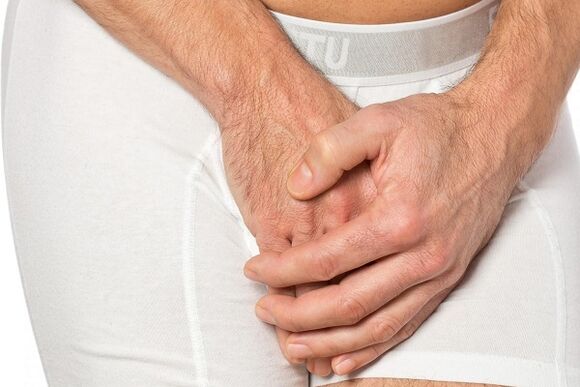
When a symptom appears, a man tries to sit or lie down, slightly bent and pulling the knees up to the stomach.
To treat the concerns, analgesics from the group of non-steroidal anti-inflammatory drugs (NSAIDs) are used. The drugs have a good analgesic effect and do not cause serious side effects.
They are not recommended for men with gastritis or stomach ulcers.
Increased urination (pollakiuria)
With prostate, a man starts running to the toilet every 1, 5-2 hours. If you drink a few liters of beer or a lot of water in the heat, the condition becomes completely unbearable: the desire occurs every 20-30 minutes.
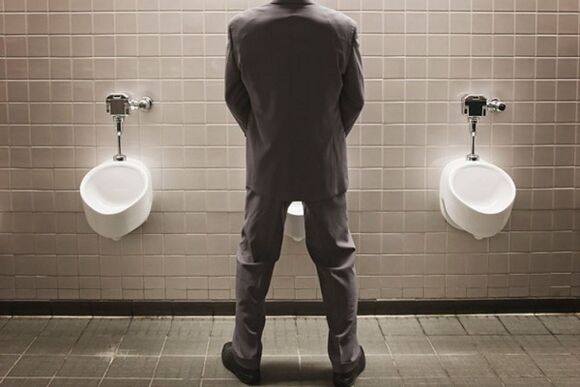
After going to the toilet, there is a feeling of incomplete urination.
With pollakiuria, no pill will help. The "drink less water" option also does not work in this case. Desires can also occur with a small amount of urine in the bladder.
Malaysia
Weakness and weakness often occur early in the disease. Many do not pay much attention to them, attributing everything to overload.
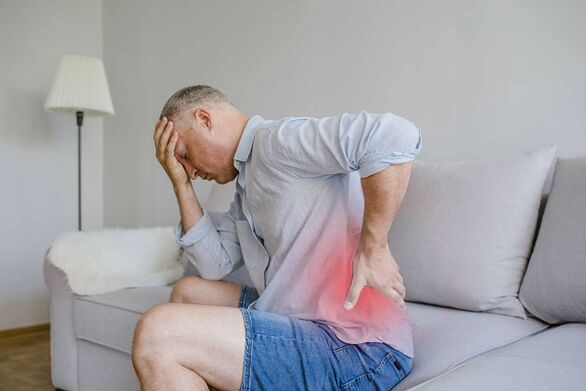
If a man after 40 suddenly has a severe fatigue, incomprehensible sensation of pain in the muscles and joints, a decrease in interest in work, this may indicate the development of prostatitis. This symptom alone does not allow the diagnosis of pathology, but when combined with 2-3 other symptoms, inflammation of the prostate is very likely.
To improve his well-being, a man needs to rest more, to normalize his daily routine. A good sleep lasting 7-8 hours is very important, and you should fall asleep no later than 11: 00. A good effect will be from vitamins both in natural form and in the form of dietary supplements(use is recommended after a personal consultation with a specialist).
Slow urine flow
Urination with an extremely weak and short flow, splashing in all directions are typical complaints of men who have faced inflammation of the prostate gland. Seeing such a problem, a person tries to strain and squeeze a "powerful current", but nothing comes out of it. For prostatitis, it is characteristic exactly the slow current, not the release of urine in drops, which is most often observed with prostate adenoma in the middle and late stages of its development.
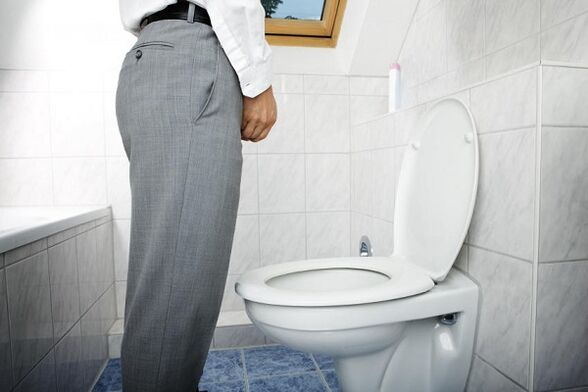
The symptoms are mainly accompanied by swelling or dystrophic changes in the tissues of the prostate gland, which blocks the lumen of the urethra. NSAIDs that facilitate bloating may provide relief in the acute process, but they will be ineffective in chronic inflammation. It is possible to remove edema at home with the help of prostate massage, but for this a man must have certain skills.
Discharge of mucus from the urethra
Points of secretion appear in the glans penis during the day. Discharge is due to prostate self-massage, which occurs when you walk fast, play sports, run. As a result, a portion of the inflammatory secretion moves along the urethra and is released outward. Often the mucus is cloudy, has an unpleasant odor and sometimes the color is faint.
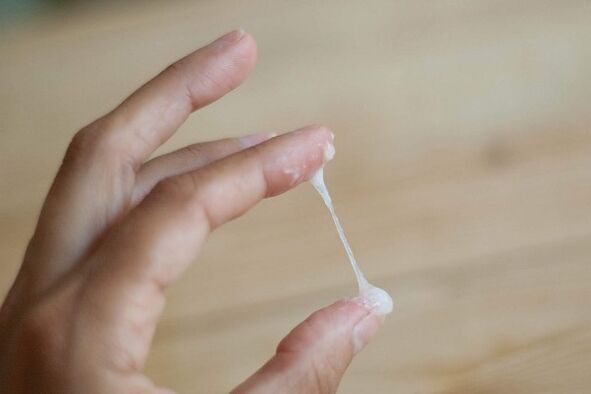
Men who face a symptom should strictly observe hygiene. The genitals should be washed at least 2-3 times a day, as the secretion accumulated in the head is an excellent medium for the reproduction of pathogenic bacteria. The genitals can be rinsed with an antiseptic solution or chamomile decoction, which helps in destroying harmful microorganisms.
Pain when urinating
A symptom of prostatitis are cramps and burning sensations (burning) in the urethra that occur during urination. Discomfort is most pronounced in the morning, as a large amount of inflammatory exudate accumulates in the prostate at night. Resi bothers a man not only during the act, but also within 15-20 minutes after it.
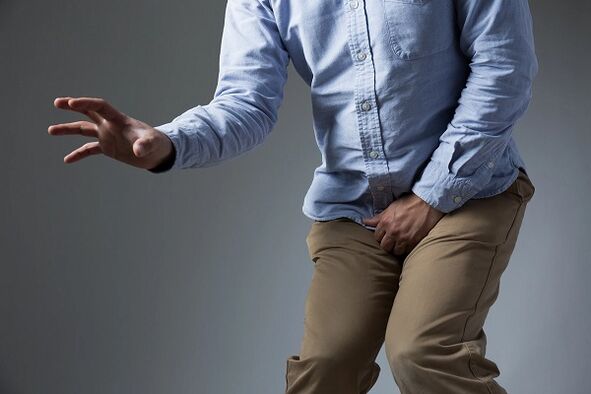
To reduce the discomfort, you can use medicines from the group of herbal uroseptics. Medications have antimicrobial and anti-inflammatory effects, they relieve symptoms and prevent inflammatory diseases of the urethra against the background of prostatitis.
Necessary incentive
Men describe this feeling as a sudden and painful desire to urinate. There is a fear of "not achieving" because the feelings are painful and very strong.
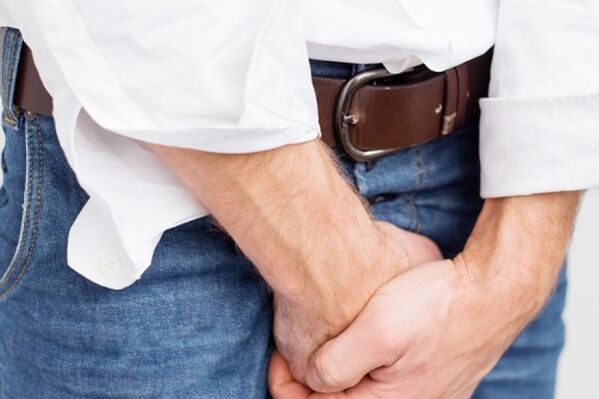
Often there is a false desire, when the flow of urine does not occur, and after a few minutes the pain subsides. Sometimes this symptom is accompanied by urinary incontinence, when a few drops of fluid appear in the laundry.
The only advice from doctors in such a situation is not to try to bear the desire. Frequent visits to the toilet cause psychological distress, but when an attempt is made to forcefully compress the muscles, the pain intensifies.
Acute prostatitis: what hurts at the same time and what sensations of the disease
Acute prostatitis in men has 9 distinctive symptoms, which are mainly observed with a sharp manifestation of inflammation of the prostate gland. We will tell you in detail about each.
Torturing pain in the groin
Men complain of strong cramps, spasms and unpleasant pulse in the hip area.
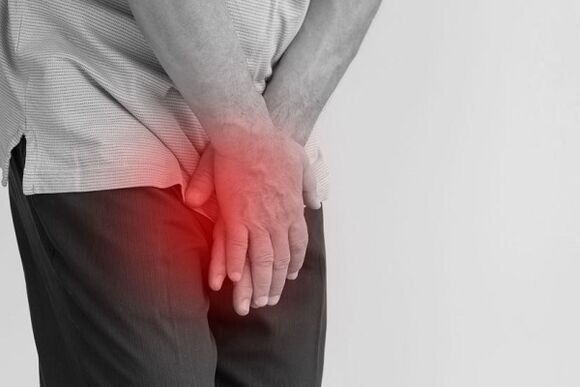
The pain bothers a person constantly, increases with prolonged sitting in a stationary position, with urination. Sometimes the pain is so strong that it is impossible to walk normally.
Symptoms occur suddenly, may be preceded by hypothermia or unprotected sex.
Discomfort should be treated. Pain relievers are used to quickly relieve the symptoms of prostatitis in men. NSAIDs are the drug of choice.
Heat
An active inflammatory process in the prostate gland is always accompanied by an increase in temperature. In acute prostatitis, fever reaches values 39-39. 5 ° C. Body temperature rises suddenly, sometimes preceding the onset of pain or other typical symptoms.
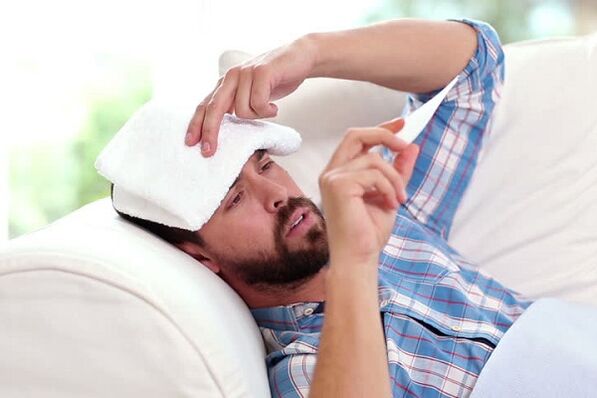
Symptoms may be accompanied by alternating periods of chills and increased sweating.
Temperatures above 38 ° C must drop. Standard antipyretic drugs are sufficient. You should not use acetylsalicylic acid to lower the temperature. There are many proven side effects when used inappropriately, so it is best to stick with safe products.
Cloudy urine
With the prostate, an inflammatory exudate is released from the gland, which appears during urination.
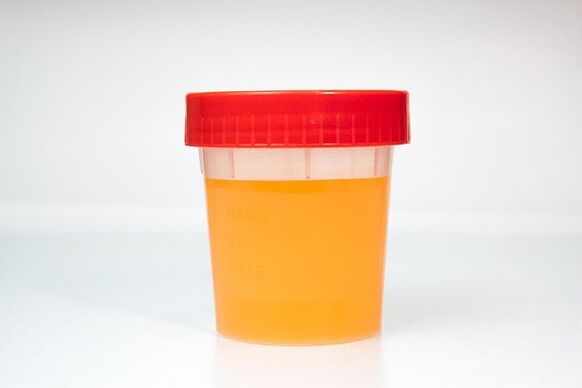
Due to this, the urine becomes turbid, sometimes individual inclusions of mucus or pus can be seen. Inflammation of the prostate gland is characterized by a change in the last part of the urine, while at the beginning of urination, the current has a familiar appearance. Turbulence is often accompanied by an unpleasant odor.
If such a symptom appears, it is worth using medication from the uroseptic group. Here, not herbal medicines are more suitable, but medicines with antibacterial effect, which are more effective in this particular case.
Purulent discharge from the urethra
The appearance of a few drops of pus from the mouth of the urethra is a typical sign of bacterial prostatitis.
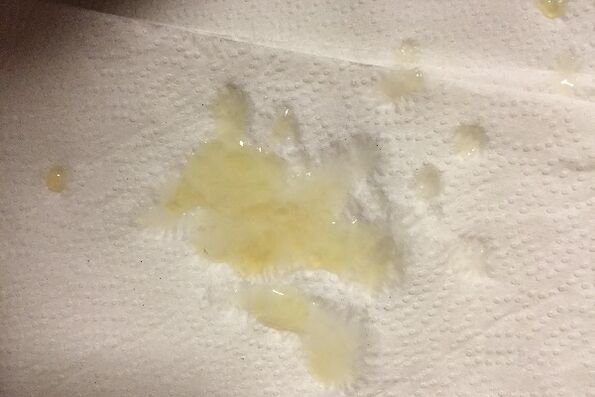
Symptoms can occur during the day as well as at the end of each urination. If prostate disease is caused by trichomoniasis, gonorrhea, or other sexually transmitted infections, there may be copious discharge of foamy, foul-smelling pus.
Symptomatic treatment is performed with uroseptics. Men are advised to observe hygiene and regularly wash the groin area with a chamomile solution or an antiseptic to prevent irritation and maceration of the skin of the penis.
At the same time, it is important to start antibiotic therapy as soon as possible in order to prevent complications that are fraught with, at first glance, harmless discharges.
Urine retention
With a sharp edema of the prostate gland, urination is impossible, as the lumen of the initial urethra is completely blocked. The man feels the desire to go to the toilet, there is an erupting feeling in the suprapubic region.
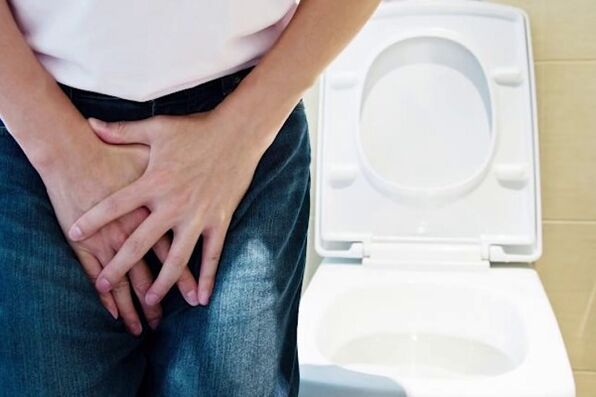
When you try to urinate, the pain intensifies, but to no avail.
Herbal preparations, which contain, for example, sabale fruit extract, help fight urinary retention. They facilitate bladder emptying and alleviate suprapubic concerns.
Headache
Symptoms of acute prostatitis include manifestations of intoxication. The inflammatory process in the prostate gland is associated with the production of specific biochemical markers that affect the condition of the whole organism.
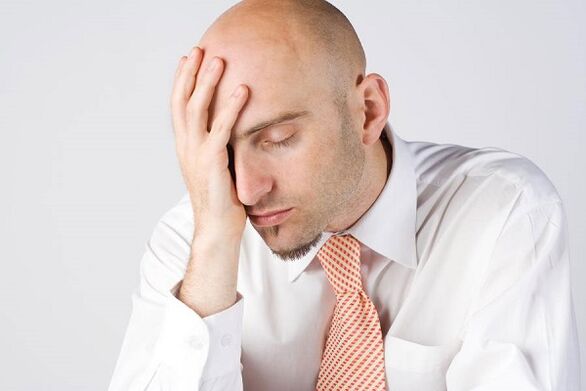
The disease is often accompanied by a high fever, against which also occurs a headache of an oppressive or coercive nature.
To relieve pain, analgesics from the NSAID group are suitable. If the discomfort is mild, the medication can be removed.
Painful bowel movements
When you empty the intestines, there is a strong pressure on the inflamed gland, so the person feels a sharp pain. Sometimes the pain becomes so strong that the person tries to contain the desire so as not to feel embarrassed.
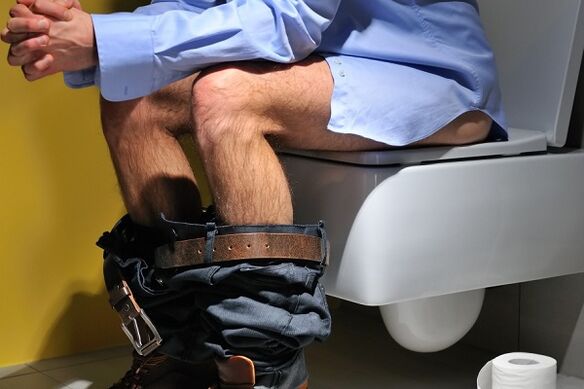
Occasionally, with the prostate, tenesmus is observed - painful "unsuccessful" request for defecation.
Unpleasant feelings can not be taken home. The pain will disappear only after the acute inflammatory process has calmed down. Do not force the bowel to move, as constipation may occur, which will make the situation worse.
Lumbosacral pain
An unpleasant symptom of prostatitis is due to general innervation (supply of nerve endings) in the pelvic organs, due to which bitterness spreads to nearby parts of the body.
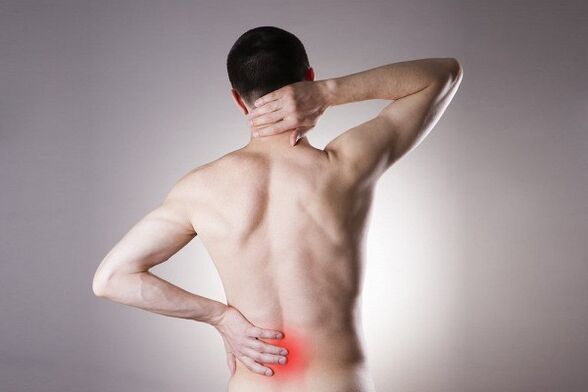
The pain can be dull, painful or sharp. Characteristic are also sharp "lumbago" in the lumbar region, which occur when straining, defecation, urination.
To eliminate the symptom, pain relievers from the NSAID part are suitable. You should not use warm baths or warming the lumbar area to relieve discomfort, as this can intensify the acute inflammatory and purulent process, accelerating its development.
Body aches
The symptom develops as one of the components of intoxication syndrome in the prostate. The man complains of discomfort in the joints and muscles: they seem to be twisted, stretched and squeezed at the same time.
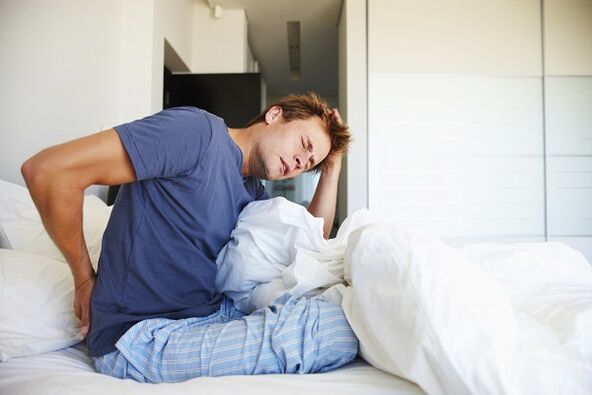
The onset of the illness is similar to the onset of a cold or flu.
There are no folk remedies or remedies to eliminate the concern. This symptom occurs mainly against the background of fever, therefore, after lowering the temperature (in any suitable way), the pain in the body disappears and the state of health improves.
Diagnosis of chronic prostatitis at home by signs and symptoms
Chronic prostatitis is distinguished by a number of signs, in order to be diagnosed at home, even before you go to the urologist.
Painful ejaculation
Unpleasant sensations bother a man when approaching orgasm: pulling pains start in the scrotum and perineum, which are given to the penis. The discomfort reaches its maximum intensity during ejaculation, when a person may experience sharp spastic pain.
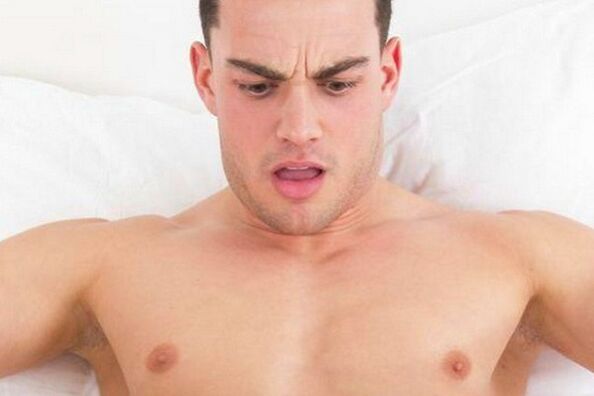
This situation is repeated with each relationship, but the strength of the painful sensations varies.
To reduce concerns, urologists recommend that a man have regular sexual intercourse (at least 2 times a week). This helps to eliminate congestion in the prostate gland. After pouring, warm sitz baths are helpful in relieving traction pain.
Frequent overnight trips to the toilet
Symptoms of chronic prostatitis include nocturia - frequent abnormal urination at night. The patient should wake up 2-3 times or more to go to the toilet.
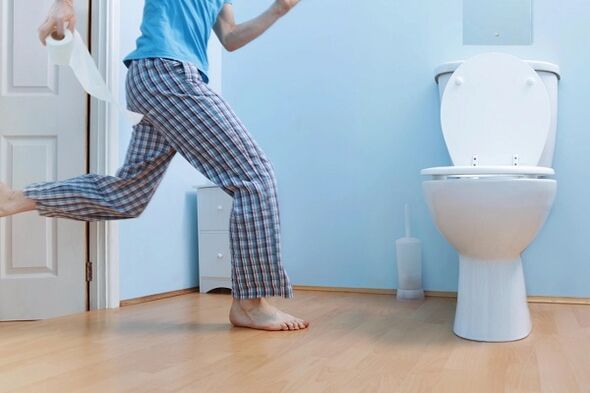
The urge to urinate is quite painful and the discharge of urine is accompanied by discomfort in the perineum and lower abdomen. Symptoms can occur regardless of the amount of fluid you drink at night.
There are no symptomatic treatments. To reduce the frequency of waking up at night, you should limit drinking water and drinks in the evening, try to completely empty your bladder before bed.
CONSTIPATION
The prostate gland increases in size and presses on the rectum, so the act of defecation is difficult. Men complain of persistent constipation lasting 3-4 days or more. When you try to stretch, the pain occurs in the perineum, the sacral region. Symptoms bother a person for weeks or even months.
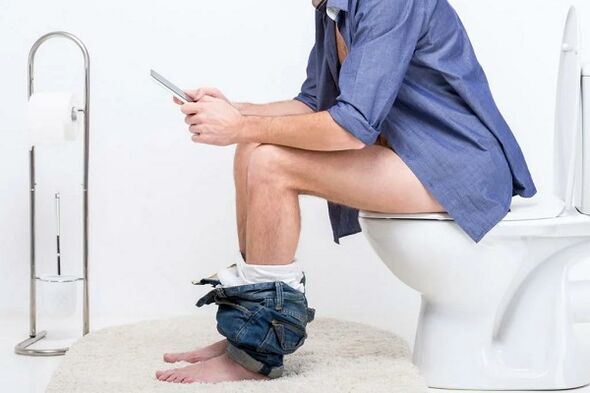
To improve bowel movements, doctors recommend eating more vegetables and fruits, whole grains. These foods are rich in fiber, which increases the volume of feces and makes them softer. Dried plums, fresh plums, kefir and other fermented milk products have a natural laxative effect. For prolonged constipation, you can use laxative tablets or suppositories.
Subfebrile temperature
An increase in thermometer readings to 37-37. 5 ° C occurs with a worsening of chronic prostatitis. In this case, headache, malaise, body aches and other typical symptoms of the disease come together.
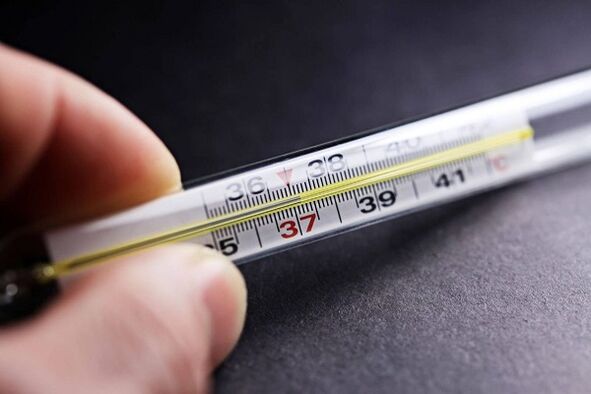
The use of antipyretics is unsuitable for indications up to 38 degrees on a medical thermometer. Relapse treatment must be performed, due to which, in fact, subfebrile condition was created.
Weakening erection
With chronic prostatitis, sexual problems can occur not only in old age but also in young men after 30 years.
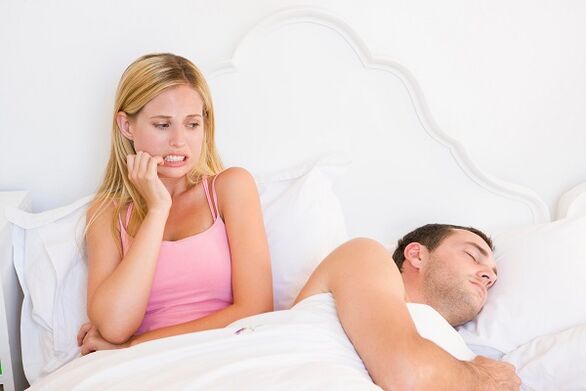
Patients complain that during waking the erection is not strong enough. This causes psychological and physical distress. For fear of "failure", the husband avoids sexual intercourse, which exacerbates the problem.
There are many folk remedies than to treat potency problems. Just a few of these: thyme decoction and hips, tincture of rowan berries, use of propolis. A man is advised to consume more celery, which has a good effect on erection, and drink ginger tea.
Reduced performance
With chronic prostatitis, a man feels constant weakness, fatigue, irritability and irritability.
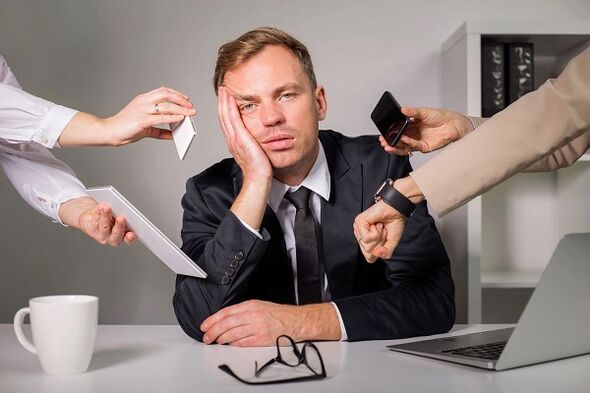
Concentration and memory inevitably decrease and it becomes more difficult to perform common work tasks. The symptoms also apply to physical work: even with minor sports training or exertion, muscle aches and severe fatigue appear.
During such a period, it is important to take care of yourself, rest a lot and not try to complete all tasks to the maximum of your abilities. After treating the prostate (or at least achieving a lasting remission), the unpleasant symptoms will disappear, then it will be possible to dive instantly into labor.
Inability to conceive a child
With the asymptomatic course of chronic prostatitis, men often go to the doctor with a complaint that they cannot conceive a child.
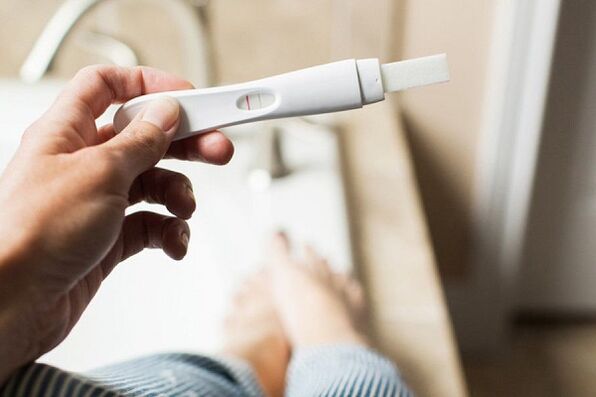
Patients say they have no pain and frequent urination, even in sex, everything can be normal. This option for the development of pathology is considered unfavorable, as it means that a person is already with an advanced form of the disease.
The production of stable and active sperm is a serious process that is regulated by the sex glands and the brain. No popular prescription and symptomatic remedies will help in this case, it is important to study and solve the problem at the medical level.
Reviews: Men's opinion in forums
- "I got signs of prostatitis more than a year ago. At first, there was a slight pull in the groin and perineum, then the pain became stronger. I noticed I wake up 2-3 times a night to go to the toilet. I did not care much. I thought I was frozen somewhere or I was sitting on a draft. Then the problems in sex started: the collection was unstable, the sensitivity decreased, there were no vivid sensations during orgasm. At work, a colleague advised me to"I took it for several months (in the form of a tincture, I bought it from a local beekeeper), the condition improved, the pain disappeared. "
- "I had pain in the scrotum, perineum and drawn lower abdomen. Sometimes a few drops of pus came out of the urethra. I read reviews online where men describe the same symptoms, went to the doctor and they were diagnosed with prostate. I know the diseaseis serious, so I decided not to delay treatment. The hospital did a bunch of tests and ultrasound, prescribed pills. The prostate healed but the bowel problems started, probably due to antibiotics. Then for another 2 months I had to buyprobiotics, then all kinds of kefir and yogurt to remove stomach discomfort ".
- "For a long time I thought I had some kind of digestive problem. I did not even know about prostatitis - I did not know that the lower abdomen hurts and the stool is disturbed. I had exactly these symptoms. I even started visiting the bathroom in asmall way, but at first I did not pay attention to this sign. It is good that I finally decided to go to the urologist. I was diagnosed with chronic prostate. I was treated for a long time, I took different pills, I put candles. "To be honest, I don't even remember the names. It kind of flew out of my head.
- "I know very well what prostatitis is. It all started suddenly for me: there was severe pain in the scrotum and suprapubic area, the urge to urinate was literally every 30 minutes. For a few days I suffered so much and went to the urologistThey did a urine test and prostate ultrasound, did a stain and the doctor wanted to see what was there rectally with one finger, but I refused, in general . . . It turned out that "acute prostatitis" had developed. The doctor prescribed antibiotics"After 2 weeks I was completely healed, there was no relapse so far, I hope there is no further, it is scary because they say prostatitis is incurable.
discovery
With any form of prostatitis, the use of symptomatic therapy alone is not quite effective. NSAIDs or analgesics will temporarily relieve pain and fever, and uroseptics will help reduce microbial inflammation. But at the same time, the pathological process in the prostate gland continues to develop, it becomes a chronic form. As a result, ultrasound changes (tissue sclerosis), erectile dysfunction, and an increased risk of prostate cancer occur.
In order not to bring the disease to sad consequences, complex treatment of prostatitis is required. The therapeutic regimen is prescribed by a physician (urologist, rarely - an andrologist), taking into account the characteristics of the disease and test results.



























